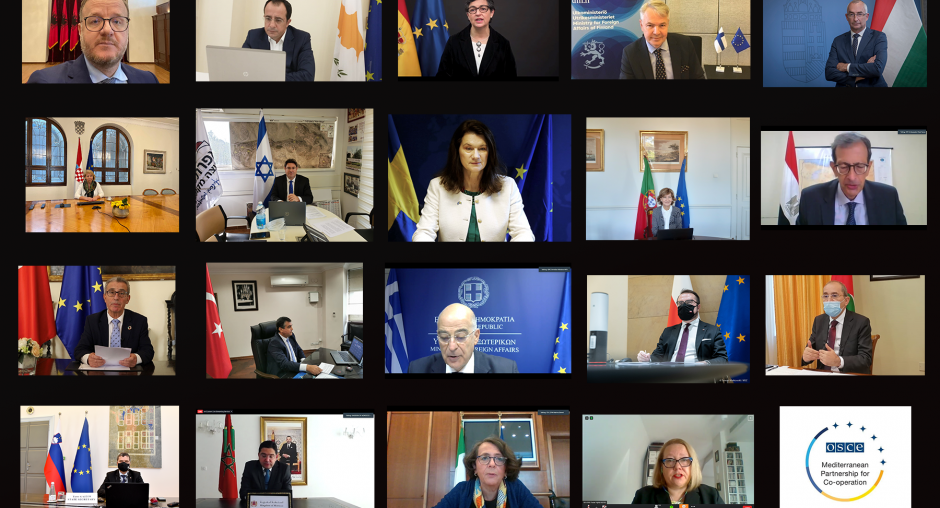Sustainable development and security are part of the same equation, note participants of OSCE 2020 Mediterranean conference

STOCKHOLM/VIENNA, 3 November 2020 – In light of the COVID-19 pandemic and numerous other challenges, high-level political representatives of the OSCE participating States and Partners for Co-operation addressed today the complex link between sustainable development and security at the 2020 OSCE Mediterranean Conference fully held online.
Chaired by Sweden, 2020 Chair of the OSCE Mediterranean Partners for Co-operation Group, over 200 participants, eight foreign Ministers, eight deputy foreign Ministers, representatives of the 57 OSCE participating States, the six OSCE Mediterranean Partners for Co-operation (Algeria, Egypt, Israel, Jordan, Morocco and Tunisia), and international organizations reviewed the security situation in the Mediterranean region by focusing on development-related aspects.
“Our post-COVID-19 recovery strategies should be used as an opportunity to take on important reforms towards fulfilling the sustainable development goals, as well as the goals of the Paris agreement,” said Sweden’s Minister for Foreign Affairs, Ann Linde. “We need to ensure that the recovery is based on the green transition. Lack of action towards climate neutrality will bring about consequences and costs that by far exceed the transition costs.”
“We also need a democratic approach towards recovery,” said Linde. This would include good governance, strengthening civil society and the respect for human rights, including freedom of expression and information – online and offline – and everyone’s freedom of religion or belief. It also includes reducing inequalities and gender inequalities. We must not leave the most vulnerable behind as we tackle this crisis,” said Linde.
Agron Tare, Albania’s Deputy Minister for Europe and Foreign Affairs said that the Mediterranean dimension is fundamental to the architecture of European security. “The global challenges we face are shared with both shores of the Mediterranean - from terrorism to climate change, to hybrid threats, to irregular immigration - and can only be tackled when we co-operate effectively. In these uncertain times, it is more important than ever to have friends, to build partnerships, to co-ordinate our responses. We need a broad cross-regional approach to face these challenges together. Side by side.”
“Recovery will require change,” said Tuula Yrjölä, OSCE Officer-in-Charge/Secretary General and Director of the OSCE Conflict Prevention Centre. “The ongoing COVID-19 pandemic has only further underscored the interdependence between OSCE participating States and the wider Mediterranean region. As we strive to overcome the pandemic and its negative impact on peace and security, contributions from our Mediterranean Partners, their ideas and perspectives will be even more crucial in the months to come,” she said. “We must focus on what needs to improve for our development models to become more sustainable.”
The OSCE Mediterranean Partnership discussions have often revolved around the correlation between more equitable development and lasting security. The 2020 discussion focused on the current dire human costs on both shores of Mediterranean, as well as the vast economic and social consequences. The Conference focused on women’s economic empowerment and their contribution to development as well as on the need to strengthen international environmental co-operation.
